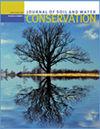伊朗西部农业水井的智能控制:q -方法论的应用
IF 2.6
4区 农林科学
Q2 ECOLOGY
引用次数: 0
摘要
智能电表作为一种支持智能农业、可持续水资源管理和提高作物生产力的方式,已在世界各地推广。尽管有这种推广,但农民,特别是小农,并没有广泛采用智能电表安装。因此,本研究采用q -方法论来调查伊朗克尔曼沙阿省Islamabad-e-Gharb镇农民对在农业水井上安装智能电表的看法。本研究是半定性研究,因此,通过有目的的抽样方法选择了21名参与者。基于q因子分析的结果,将农民对安装电表的看法分为三种启发式模式,包括安装智能电表的效用(方差= 34%,特征值= 7.08)、安装智能电表的社会和文化效率低下(方差= 32%,特征值= 6.74)和减少农业收入(方差= 4.15%,特征值= 19.76)。安装智能水表(21:+4),实际上,为灌溉用水定价被认为是可持续水资源管理的管理解决方案(2:+3)。这个数字(21:+4)意味着,例如,在第一组中有这个项目(21)的人应该注意节水实施计划。大多数农民对提供智能电表的高成本以及从传统灌溉向机械化灌溉的强制性转变等项目持相同意见。因此,农民对水资源的可持续管理和智能水表的作用有一个共同的认识。尽管水资源短缺,但农民认为他们没有权利要求更多的水,因为这意味着其他人的水会减少,这将违反可持续水资源管理的原则。识别这些不同的看法可以直接影响智能仪表农业水井领域的政策制定。它可以为每个人制定政策,从而增加扩展的影响并降低成本。本文章由计算机程序翻译,如有差异,请以英文原文为准。
Smart control of agricultural water wells in western Iran: Application of the Q-methodology
Smart meters have been promoted around the world as a way to support smart farming, sustainable water resource management, and increased crop productivity. Despite this promotion, farmers, particularly small-scale farmers, are not widely adopting smart meter installation. Therefore, this study employed Q-methodology to examine farmers’ perceptions from Islamabad-e-Gharb township (Kermanshah Province, Iran) toward smart meter installation on agricultural water wells. This research is a semiqualitative study, and for this reason, 21 participants were selected through a purposeful sampling method. Based on the results of Q-factor analysis, farmers’ perceptions toward the installation of the meter were categorized as three heuristic patterns including the utility of smart meter installation (variance = 34%, eigenvalue = 7.08), social and cultural inefficiency of installing smart meters (variance = 32%, eigenvalue = 6.74), and reducing income from agriculture (variance = 4.15%, eigenvalue = 19.76). Installing a smart meter (21: +4), and, indeed, pricing irrigation water are considered as management solutions for sustainable water resources management (2: +3). This number (21: +4) means, for example, people with this item (21) in the first group should pay attention to the water conservation implementation plans. Most farmers had the same opinion regarding the items such as the high cost of providing smart meters and the compulsory change from traditional to mechanized irrigation. Therefore, farmers have a common perception of the sustainable management of water resources and role of smart meters. Despite water scarcity, farmers feel they have no right to demand more water as it would mean less water for others, which would be against the principles of sustainable water management. Identifying these different perceptions can directly affect policy-making in the area of smart meter agricultural water wells. It could create policies for each one, thereby, increasing the impact of extension and reducing costs.
求助全文
通过发布文献求助,成功后即可免费获取论文全文。
去求助
来源期刊
CiteScore
4.10
自引率
2.60%
发文量
0
审稿时长
3.3 months
期刊介绍:
The Journal of Soil and Water Conservation (JSWC) is a multidisciplinary journal of natural resource conservation research, practice, policy, and perspectives. The journal has two sections: the A Section containing various departments and features, and the Research Section containing peer-reviewed research papers.

 求助内容:
求助内容: 应助结果提醒方式:
应助结果提醒方式:


